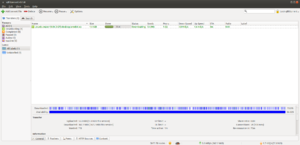QBittorrent
 |
|

A screenshot of qBittorrent v3.1.8 running under Ubuntu MATE
|
|
| Original author(s) | Christophe Dumez |
|---|---|
| Developer(s) | Sledgehammer999, Christophe Dumez, Ishan Arora, Stefanos Antaris, Mohamadad Dib |
| Initial release | May 16, 2006 |
| Stable release |
3.3.12 / April 6, 2017
|
| Preview release | N/A |
| Repository | https://github.com/qbittorrent/qBittorrent, https://github.com/qbittorrent/qBittorrent.git |
| Written in | C++ (Qt) |
| Operating system | Cross-platform: FreeBSD, Linux, OS X, OS/2, Windows |
| Platform | ARM, x86 |
| Available in | 35 languages |
| Type | BitTorrent client |
| License | GPLv2+ |
| Website | qbittorrent |
qBittorrent is a cross-platform client for the BitTorrent protocol. It is free and open-source software released under the GNU General Public License version 2 (GPLv2).
qBittorrent is written in the programming language C++, using Boost so it is an operating system native application. It also uses the Qt framework, version 4 or 5. It uses libtorrent-rasterbar library for the torrent back-end (network communication) functions. Its optional search engine is written in the language Python. Systems with no Python installed cannot use the search function.
qBittorrent aims to be small, powerful, intuitive, visually attractive, and to exceed the current functions provided widely by other applications. qBittorrent is an attempt to provide a μTorrent equivalent that is open-source, multiplatform, and adds a streaming-like function to let users download and play video files. qBittorrent currently offers functions comparable to other BitTorrent clients, such as Vuze, but without needing the Java virtual machine. qBittorrent needs Python for the search engine only, while other clients such as Deluge and BitTornado need it for their BitTorrent protocol. For its BitTorrent and (μTP) implementation, qBittorrent uses the Rasterbar libtorrent library, which is written in C++.
qBittorrent was originally developed in March 2006 by Christophe Dumez, from the Université de technologie de Belfort-Montbéliard (University of Technology of Belfort-Montbeliard) in France.
...
Wikipedia
